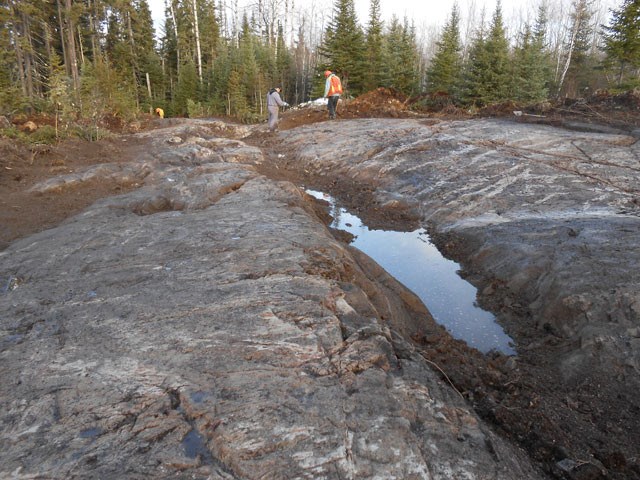TORONTO — A Superior Court judge has extended an interim injunction against mineral exploration in the non-reserve portion of Wiisinin Zaahgi'igan, an area that Ginoogaming First Nation has described as a sacred and cultural part of its traditional territory.
Justice Susan Vella has ordered Ontario to engage in "meaningful consultation" with Ginoogaming, and to appear before her again in six months.
The decision leaves the future of Greenstone businessman Michael Malouf's mining claims up in the air.
Malouf owns Quarternary Mining & Exploration Inc. and Hardrock Extension Inc.
He says the decision sets a precedent that tells the mining industry "if you involve yourself in exploration and find something, it can be taken away from you...there is no protection."
Judge Vella expressed sympathy for Malouf, saying he is "caught in the middle between the Crown and Ginoogaming who are seemingly at an impasse."
She noted that there is no feasible way Quarternary can determine the potential mineral production of its mining claims until it can enter the property and explore it.
However, the court found that Ginoogaming had demonstrated that extending the injunction is necessary because the Crown failed in its duty to adequately consult the First Nation before granting an exploration permit.
The province accepted that Wiisinin Zaahgi'igan contains locations of cultural and spiritual importance to Ginoogaming, but said it initially received no response when it asked the First Nation if it had any concerns before it granted Malouf a permit in 2019.
After the permit was issued Ginoogaming informed the Ministry of Energy, Northern Development and Mines that the project was located on land that was of high cultural and spiritual significance.
The province maintained that its hands were tied because the only outcome satisfactory to the First Nation would be a revocation of the exploration permit.
Vella observed in her ruling that the government's argument, in other words, was that "Ginoogaming will not accept any accommodation."
But she questioned the adequacy of consultation prior to issuing the permit, which included a notice provided by letter and a follow-up email, saying "this does not seem to me to be effective communication."
The judge also noted Elder Victor Chapais' statement that "We did everything we could to be diplomatic in an Anishinaabe way: through talking, listening and trying to reach an understanding."
She added that "Critically, the evidence also demonstrates...that for the Anishinabek, 'silence doesn't mean agreement or indifference.' "
Ginoogaming is suing the province, seeking permanent protection of the area it considers sacred.
It had sought a permanent injunction pending the outcome of the lawsuit.
First Nation's lawyer says the issue can be resolved out of court
The First Nation's lawyer, Kate Kempton of OKT Law, said Tuesday she believes that although all three tests for the granting of such an interlocutory injunction were met, Judge Vella "wants the parties to talk more, because that's in keeping with the mandate of reconciliation."
Kempton said that if the parties can't work things out between themselves, there's potential for the interlocutory injunction to be granted early next year.
"We're extremely thrilled to have been able to succeed on this to date, and protect this area of keystone cultural and sacred importance. Come January, we'll have to see what happens."
Kempton said Ginoogaming would still prefer to avoid going to court at all.
The Crown, she said, has the legal tools available to protect Wiisinin Zaahgi'igan.
"It isn't that big. They have methods under the Mining Act, under the Heritage Act, Orders in Council could be passed permanently protecting the area from any industrial development."
Kempton said letters about this to Premier Ford and ministers responsible were never acknowledged, which she called disrespectful.
Malouf expressed shock over the ruling, saying "we didn't get a fair shake."
He said the decision essentially means that exploration firms can spend millions of dollars looking for minerals before First Nations "out of the blue" can say "we have first dibs on it, you go look somewhere else."
According to Malouf, his claims in the Ginoogaming area are less than a thousand metres from a new gold mine under development just outside Geraldton.
"There's a smell of big money in the air...The pit is on our immediate west boundary...all the gold that's ever been found in the area is in an envelope of magnetics, it's all been mapped, and we have 24 kilometres of all the gold showings and six major targets alongside this new mine."
Malouf might consider an appeal but said "It beats you up. It's been over a year that we have been able to do nothing but work on this problem. My health is not good."
In a similar dispute over exploration near Kitchenuhmaykoosib Inninuwug a dozen years ago, Ontario paid Platinex Inc. $5 million to settle a lawsuit and give up its claims at Big Trout Lake.
